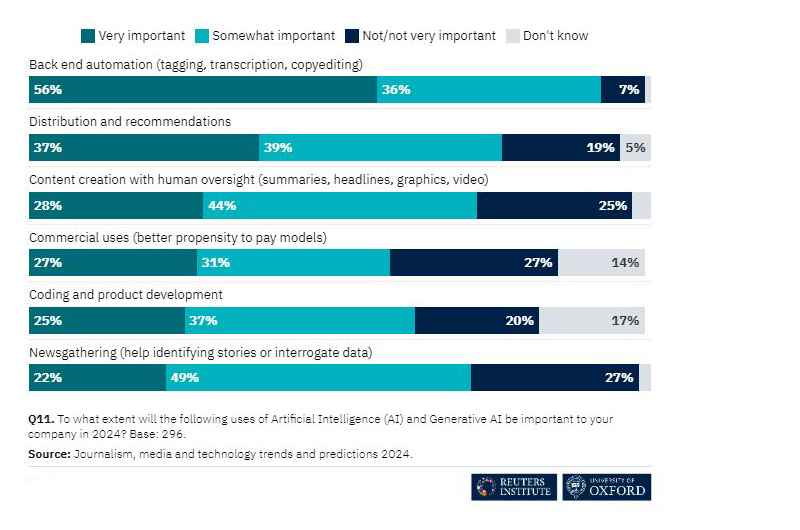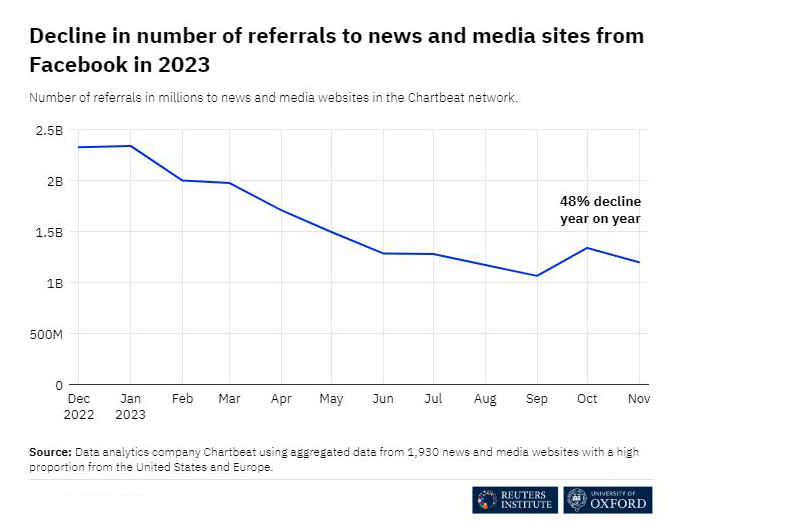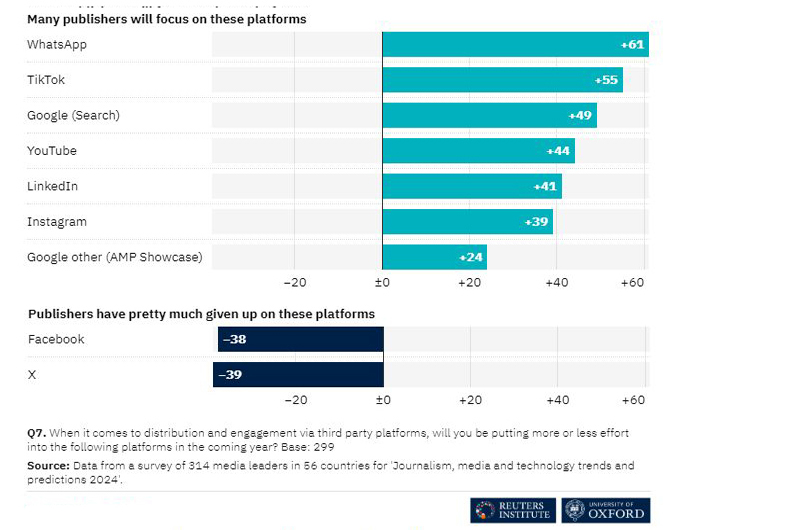Globally, news media faces an uncertain future, compounded by general mistrust, big tech challenges, and mis/disinformation at scale. The good news is that across the world, editors, publishers and newsroom leaders are (mostly) up to the challenge. Lucinda Jordaan explains
In our final newsletter for 2023, we asked our affiliation of global editors for their biggest newsroom challenges for the year, and outlook for 2024. Perhaps unsurprisingly, three core issues emerged: accelerated advances in AI and its impact on newsrooms; economic sustainability, and shifting global politics. “About 40 per cent of the world’s population, and 42 per cent of its GDP, have a chance to elect new leaders next year,” said Kevin Dubouis, director of Content Strategy at The Wall Street Journal, who cites “changes in the world” as a core focal point for the year ahead.
New disruptors: AI, automation and Big Tech
“AI has been supremely disruptive and promises to be even more so. Recognising its undeniable potential and veritable perils, we’ve developed an AI Framework to help us harness the benefits while mitigating the potential dangers; overarching, is the idea of AI as an enabler not a replacer of our journalists/journalism,” noted Joe Ageyo, editor-in-chief at Kenya’s Nation Media Group.
Maria Jesus Espinosa de los Monteros, directora general de Audio at Prisa Media (Spain) is also predicting a strong focus on AI “because we are in a transformation industry” and hoping 2024 will bring regulations “and global law about AI.” These sentiments are echoed in a new report from Reuters Institute for the Study of Journalism, titled Journalism, media, and technology trends and predictions 2024, and published this week.
AI uses which will be key for news publishers in 2024
Back end automation and content creation are now much more important than two years ago. Data from a survey of 314 media leaders in 56 countries for ‘Journalism, media and technology trends and predictions 2024’.

Megan Clement, editor-in-chief of Impact newsletter for Gloria Media in France, cited her biggest challenge in 2023 as “finding wider audiences for our work as social media declines.” This year, she’ll be assessing the impact of AI on gender equality reporting, and promoting “increased coverage over gender inequality in mainstream media outlets.”
This tracks with Reuters’ survey, which found that“Almost two-thirds (63per cent) of our survey respondents say they are worried about a sharp decline in referral traffic from social media sites. According to the survey: “Data sourced for this report from analytics provider Chartbeat shows that traffic to news sites from Facebook fell 48 per cent in 2023, with traffic from X/Twitter declining by 27 per cent.”
Decline in number of referrals to news and media sites from Facebook in 2023
Number of referrals in millions to news and media websites in the Chartbeat network.
Bang on the money
For some newsrooms, staying afloat presented the most pressing challenge. Some cited the COVID-19 pandemic as the source of ongoing shrinking revenues, others on shifting positions in donor funding due to hostilities in Gaza. For most, the focus will be on financial sustainability:

Fatemah Farag, of independent Welad ElBalad Media will be pursuing “the usual revenue generation agenda, with an added focus on AI,” while Pius Katunzi, managing editor of The Observer in Uganda aims to “diversify the channels of distribution of our content” with a multimedia platform.
And, according to Reuters, this is in line with most publishers worldwide: “the majority of our publisher respondents say they plan to create more video (+64 net score), more newsletters (+52), and more podcasts (+47), but broadly the same number of news articles – as they lean into some of the few remaining areas of audience and advertiser growth.”
What news publishers are planning to produce more of
Data from a survey of 314 media leaders in 56 countries for ‘Journalism, media and technology trends and predictions 2024’.
Elections, past and present
Several respondents cited elections, either in 2023 or upcoming, as the most significant challenge – along with dis/misinformation, ethnic clashes, and migration issues.
“One of the most significant challenges in my work in the year 2023 was navigating the prevalence of fakes on social media, particularly during and after the 2023 general elections …We had to constantly reassess our content strategy and adopt a more solid fact-checking approach – which included investing resources in training journalists as a response to counter the gale of misinformation. We also leveraged social media campaigns, webinars and partnerships with other newsrooms and youth-driven organisations for massive sensitisation on the danger of fake news – especially among the youths,” said Abiola Rahaman, editor-in-chief at Legit Media in Nigeria.
“As India heads into an election year, our focus will be to stay on top of debunking political misinformation and disinformation.Over the past few months, India has seen a sharp uptick in synthetic videos and audio (with increased use of deep fakes and other video cloning tools). These are being increasingly used to spread fake news, target political rivals, and polarise and mislead voters through propaganda. The ruling government now plans to regulate this space and introduce rules around synthetic media that mimic authentic images, video, and audio. Our job would be to evolve with these potential changes,” noted Shelly Walia, executive editor of The Quint in India.
Immigration is a core focus for independent non-profit Documented and, in 2023, the organisation was focused on how the city responds to the influx of immigrants to New York. “The asylum seekers numbers in NY will surely impact the news cycle; immigration will be a huge subject for the US presidential election, said Nicolas Rios, director of Audience and Communities, Documented (USA). Here, too, AI will stake its claim, added Rios: “AI impacting search, our main audience driver, will also be an internal priority to look at. We just launched our two new direct-to-user products on WeChat and NextDoor. We aim to consolidate a user base in those two platforms and be able to integrate those conversations in our content creation processes.”
Publishers plan to lean into WhatsApp, TikTok, YouTube
Numbers shown represent news leaders surveyed who say they will put more effort on each platform, minus those who say they will put less effort.

Lastly, another positive general outlook, from Asia: “With so many wars raging across the world, it’s easy to get caught up in what feels like the more urgent stories and forget about the fundamental issues that are calling for coverage,” said Hui Yee Tan, bureau chief for The Straits Times in Thailand. “I aim to stay focused on that. Also, while organisational change is hard, I hope to facilitate more inclusive, gender-sensitive journalism in my newsroom and beyond.”
(By special arrangement with WAN-IFRA. The writer is an independent media consultant with extensive experience in all media sectors and on all publishing platforms, from print and digital to film and broadcast. She now freelances as a writer, editor, consultant and coach: providing full-suite media and communications services to media enterprises and agencies. She regularly writes for the WAN-IFRA World Editors Forum.)



 from Webdoux
from Webdoux